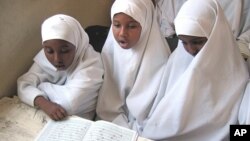NAIROBI —
A new report from the U.N. Children's Fund, UNICEF, finds more children are going to school in the Somali regions of Puntland and Somaliland. Both regions enjoy relative peace and stability compared to restive south and central Somalia. But a challenge remains in getting more girls enrolled in school.
A survey conducted by the ministries of planning for the two regions and UNICEF found very encouraging figures on young children's education. In Puntland, the number of students enrolled in primary education went from 26 percent to 43 percent over the last five years. A smaller rise was reported in Somaliland.
Susannah Price, the chief of communications for UNICEF Somalia, says communities are benefiting from an increasing number of schools being built in the region.
"UNICEF, for example, have worked very hard on training enough teachers, working on non-formal education as well as alternative kind of education - for example for the pastoralist children," she said. "We have also worked with community committees within the community, helping to support them and also help with building classrooms, building schools. Education is absolutely key for the future of Somalia."
However, challenges remain in convincing parents to send girls to school just like boys.
Price says her organization promotes gender equality in education and is striving to improve girls’ access to education.
"We’ve been focusing on changing attitudes on girls' education, to talk to parents to explain to them why education of girls is as important as to the education of their brothers, why you shouldn’t keep girls at home to do house work while they need to go to the….," she said. "We’ve also helped with scholarships for girls to get them to school, to get them to higher education and to change their attitudes as well and to use girls who have succeeded in education to talk to other girls to persuade them to come to school as well."
UNICEF says education could help the regions improve in other areas of development that are lagging behind, such as health care.
The survey showed no great improvement in health and nutrition in the past five years, while immunization coverage also remains low.
The report only covered the autonomous and semi-autonomous regions of Somalia, as surveyors said it was too dangerous to conduct research in central and southern Somalia. But they are planning to organize a survey for the rest of Somalia when security improves.
A survey conducted by the ministries of planning for the two regions and UNICEF found very encouraging figures on young children's education. In Puntland, the number of students enrolled in primary education went from 26 percent to 43 percent over the last five years. A smaller rise was reported in Somaliland.
Susannah Price, the chief of communications for UNICEF Somalia, says communities are benefiting from an increasing number of schools being built in the region.
"UNICEF, for example, have worked very hard on training enough teachers, working on non-formal education as well as alternative kind of education - for example for the pastoralist children," she said. "We have also worked with community committees within the community, helping to support them and also help with building classrooms, building schools. Education is absolutely key for the future of Somalia."
However, challenges remain in convincing parents to send girls to school just like boys.
Price says her organization promotes gender equality in education and is striving to improve girls’ access to education.
"We’ve been focusing on changing attitudes on girls' education, to talk to parents to explain to them why education of girls is as important as to the education of their brothers, why you shouldn’t keep girls at home to do house work while they need to go to the….," she said. "We’ve also helped with scholarships for girls to get them to school, to get them to higher education and to change their attitudes as well and to use girls who have succeeded in education to talk to other girls to persuade them to come to school as well."
UNICEF says education could help the regions improve in other areas of development that are lagging behind, such as health care.
The survey showed no great improvement in health and nutrition in the past five years, while immunization coverage also remains low.
The report only covered the autonomous and semi-autonomous regions of Somalia, as surveyors said it was too dangerous to conduct research in central and southern Somalia. But they are planning to organize a survey for the rest of Somalia when security improves.









